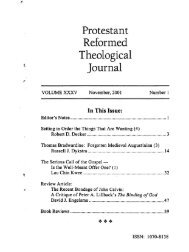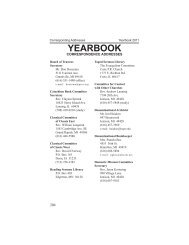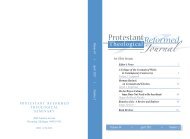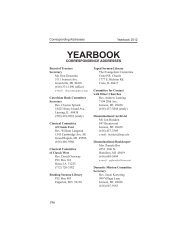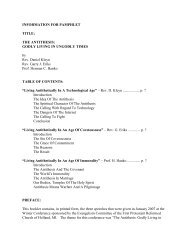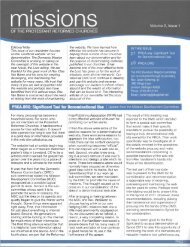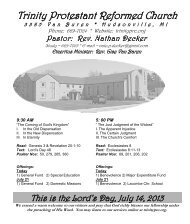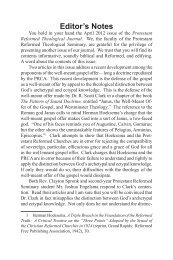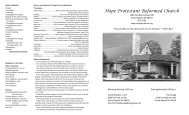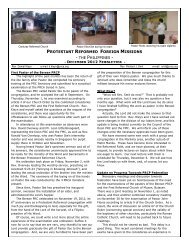November 2007 - Protestant Reformed Churches in America
November 2007 - Protestant Reformed Churches in America
November 2007 - Protestant Reformed Churches in America
Create successful ePaper yourself
Turn your PDF publications into a flip-book with our unique Google optimized e-Paper software.
as to identify covenant and election.”*<br />
But more troublesome is T.<br />
David Gordon’s <strong>in</strong>sistence that<br />
God has a plurality of covenants—no<br />
fewer than 12 (<strong>in</strong>clud<strong>in</strong>g<br />
the covenants of redemption,<br />
works, and grace;<br />
and the various covenants of<br />
God with men <strong>in</strong> the Old Testament).<br />
He argues that the term<br />
“the covenant” (s<strong>in</strong>gular) is<br />
rarely used <strong>in</strong> the Bible, and<br />
when it is, usually the Scriptures<br />
identify the covenant to<br />
which the term refers. This<br />
prompted me quickly to search<br />
the KJV, <strong>in</strong> which I found 102<br />
<strong>in</strong>stances of “the covenant”<br />
(s<strong>in</strong>gular), 51 of “my covenant”<br />
(s<strong>in</strong>gular), 18 of “his covenant”<br />
(s<strong>in</strong>gular), and only three times<br />
where the word “covenant” is<br />
found <strong>in</strong> the plural. So I f<strong>in</strong>d it<br />
hard to swallow the argument<br />
that Murray’s view that God has<br />
one covenant with His people<br />
has generated the heretical<br />
views of Shepherd, Bahnsen,<br />
and Auburn theology.<br />
White and Beisner’s chapter<br />
is troublesome because it<br />
argues that conditions played a<br />
role <strong>in</strong> the covenant adm<strong>in</strong>istrations<br />
of God <strong>in</strong> the Old Testament.<br />
Accord<strong>in</strong>g to them, Adam<br />
<strong>in</strong> the state of perfection could<br />
merit eternal life by his obedi-<br />
Book Reviews<br />
ence. The seeds of Noah,<br />
Abraham, and David enjoyed<br />
temporal, earthly bless<strong>in</strong>gs (accompanied<br />
by temporal curses)<br />
on the basis of the obedience of<br />
these men. These bless<strong>in</strong>gs<br />
were temporal and earthly only,<br />
and not everlast<strong>in</strong>g and spiritual,<br />
because the obedience of<br />
these men was not perfect. The<br />
authors speak of the Mosaic<br />
covenant as “bilateral, conditional”<br />
(p. 160). White and<br />
Beisner are clear that the covenant<br />
of God with His people <strong>in</strong><br />
the new dispensation is not conditioned<br />
on any works that we<br />
do, but is founded on the person<br />
and work of Christ. But the<br />
thoughts expressed <strong>in</strong> the chapter<br />
underm<strong>in</strong>e the idea that<br />
God’s covenant with His people<br />
throughout history is one covenant;<br />
that it was always based<br />
on Christ; that all the bless<strong>in</strong>gs<br />
of that covenant were bless<strong>in</strong>gs<br />
bestowed by grace, not earned<br />
by works. Scriptures such as<br />
Romans 4:13-16 and others contradict<br />
the ideas set forth <strong>in</strong> this<br />
* David J. Engelsma, The Covenant<br />
of God and the Children of<br />
Believers: Sovereign Grace <strong>in</strong> the<br />
Covenant (Jenison, MI: <strong>Reformed</strong><br />
Free Publish<strong>in</strong>g Association,<br />
2005), p. 176.<br />
<strong>November</strong> <strong>2007</strong> 109



